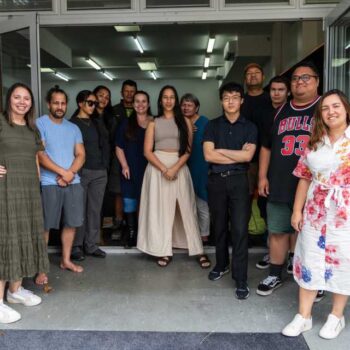Helping businesses do more with less
Advice on addressing economic headwinds and skills shortages effecting NZ SMEs.
Quanton’s Garry Green says four key trends he’s picking for 2024 all have one important thing in common: helping Kiwi businesses do more with less to address economic headwinds and skills shortages.
As New Zealand businesses struggle with workforce shortages, economic headwinds and inflationary challenges, while also facing increasing customer expectations, good enough is no longer good enough. Local businesses are increasingly turning to disruptive technologies to transform their business and do more with less.
That’s the message from Garry Green, Quanton MD and founder, who says changes to the way we work caused by the pandemic and Russia’s invasion of Ukraine, haven’t bounced back to normal.
He says that’s putting even more focus on how technology can be used to bring genuine business benefits – increasing productivity, agility and innovation and helping address skills shortages.
Green sees four key trends shaping the local market this year – all with their own unique powers to aid businesses.
1. Generative AI for personal automation and productivity
Generative AI, is a technology that has been trained on a huge dataset of existing text, audio files and images to create new content and has been around for a while now – from Microsoft’s auto-prompts when you’re typing, to what everyone is talking about – OpenAI’s DALL-E deep learning model, which enable’s users to create an image just by typing natural language requests such as ‘an armchair in the shape of an avocado’.
“Generative AI will be the biggest AI trends of 2024 and will start to disrupt many industries moving forward; its ease of use, ability to be rapidly integrated, high value and low cost will be pivotal in driving its adoption in New Zealand.
“Businesses that are agile and forward looking will seize the opportunity provided.”
OpenAI’s ChatGPT is a conversational language that uses deep learning to generate human-like text. It is trained on a massive dataset of conversational text, making it capable of understanding and responding to a wide range of topics and questions. It can be used in a variety of applications.
ChatGPT and other language models like it have the potential to be highly disruptive in many industries. For example:
• In customer service, chatbots and virtual assistants powered by language models can automate many routine tasks and help companies provide 24/7 service at a lower cost. This can lead to increased efficiency and customer satisfaction.
• In the field of content creation, they can be used to generate written content, such as news articles, product descriptions, and even creative writing. This has the potential to revolutionise the way content is produced, making it faster and less expensive to create high-quality content.
The potential uses of such language models are still being explored and developed, but it is clear that they have the potential to revolutionise many industries and change the way we interact with technology.
“Imagine if anyone in your company could create their own personal automation just by typing in their requirement, generating a ‘skeleton’ automation with the required activities.
“It could be as simple as an automation to save Excel attachments in Outlook emails from a particular person to a particular location. Or it could be a lot more complex, from helping businesses with predictive maintenance, improving cybersecurity analytics, or generating innovative ideas for solutions.
While creating entire software applications using natural language might still be years away, targeted use cases are not only within reach, but already being achieved today. GitHub’s Copilot, powered by OpenAI Codex, has shown how the dreams of using AI for coding truly are within reach.
2. Automated Machine Learning with feedback loops to democratise AI
Machine learning (ML) is still largely the domain of skilled data scientists. But what if you could develop an optimal ML model without extensive data science knowledge and use human involvement for exceptions only, with the AI learning from those humans?
What if you could bring AI closer to the people who know your customers the best – your employees – through automated ML with rapid feedback loops?
That is the promise of automated ML, Green says. “It removes the need for scarce data scientists to design ML models and fine tune the performance of different algorithms. This offers the potential to reduce the time and cost, enabling quicker time to market.”
Automated ML with feedback loops – which are key to improving the performance of models – allow more frequent model retraining and validation in real time to ensure the predictive model is up to date.
3. Low-code/no-code to power up innovation – democratising access to automation and AI to drive business value
Low-code/no-code has been bubbling away for several years now. Gartner has forecast that by 2025, 70 percent of new apps developed by enterprises will use low-code/no-code technologies.
“Imagine if everyone in your business was capable of building customer-centric applications to address your customer’s and business needs,” Green says.
Your business would take a quantum leap in agility and responsiveness, be more attuned and aligned with its customers, and be able to respond rapidly to the market, ahead of your competitors getting new innovations to market that much faster.
4. Process orchestration workflow for productivity at scale
New Zealand organisations have been struggling to deliver productivity at scale when it comes to operational improvement or automation, Green says.
Process orchestration workflow, orchestrating end-to-end workflows across your business, drives value across end-to-end customer journeys enabling efficient use of both humans and bots.
It’s an opportunity to manage workflows and orchestration of work across a hybrid workforce and ensure the right work gets to the right human, or robot, on time.
The automation layer connects people, processes, systems, and internal and external data, eliminating fragmented processing and data silos to provide a unified view of operations.
And with that end-to-end visibility of your processes, you gain a clear understanding of the bottlenecks within a process – and with it an opportunity for continuous improvement!
“In Quanton’s experience, organisations using process orchestration have typically seen increases in operational efficiency of up to 20 percent.”
Green says all four trends have the power to help New Zealand organisations be market leaders and increase productivity and agility.
“Even better, we’re seeing an increasing move of automation and disruptive technologies into New Zealand mid-market businesses. They see the benefits and can act quicker than big enterprises.
“Although we have significant economic and business challenges, the smart utilisation of these technologies can give businesses a significant competitive advantage in 2024 and beyond.”






